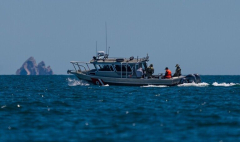- Experts believe fewer than 10 vaquita, the world’s smallest porpoise, survive in Mexico’s Gulf of California, also known as the Sea of Cortez, the only place the species lives.
- Illegal fishing has decimated their population, forcing environmental groups to come up with innovative conservation solutions.
- Vaquitas get caught in illegal gillnets that fishermen use to target totoaba, a fish whose swim bladder can go for tens of thousands of dollars per kilo on the international black market.
- Some environmental groups have focused on patrolling vaquita habitats with ships, sonar, radar and drones, while others maintain that dismantling the organized crime groups behind the totoaba trade is a better use of resources.
MEXICO CITY — Fewer than 10 vaquitas, the world’s smallest porpoise, survive in the wild today, experts say. Illegal fishing has decimated their population in the Gulf of California, the thin stretch of water between Baja California and mainland Mexico, where they’re endemic. Conservation groups and government agencies have been working on innovative solutions to protect the species so it can recover, but they’re not all taking the same approach. While some focus on patrols of the vaquita habitat, others maintain it’s more important to fight the international wildlife trafficking networks behind their demise.
“This is not a Mexico problem,” said Andrea Crosta, founder of Earth League International, a U.S.-based environmental crime intelligence group. “If we keep looking at this as a Mexico problem, we will never, ever succeed.”
The population of vaquitas (Phocoena sinus) numbered around 600 in the 1990s, according to the Porpoise Conservation Society, a Canadian organization. But it drastically declined in the 2010s as fishers began targeting totoaba (Totoaba macdonaldi), a fish whose swim bladder is considered a delicacy in China because of its supposed medicinal qualities. Local fishers catch totoaba with gillnets, which Mexico banned in 2016. They often intercept vaquitas by mistake, as bycatch, ultimately killing them.
Today, the vaquita is listed as critically endangered and the totoaba as vulnerable on the IUCN Red List of Endangered Species.

In 2005, the Mexican government created a 1,263-square-kilometer (488-square-mile) vaquita refuge where fishing is illegal. Then, in 2020, as numbers continued to dwindle, it implemented a stricter 288-km2 (111-mi2) zero-tolerance area (ZTA) overlapping the refuge, where boats are banned from entry altogether. The Mexican Navy has also partnered with the Sea Shepherd Conservation Society, a U.S.-based direct action group, to monitor illegal fishing and implement new technology to track the vaquitas in case they should need rescue.
Starting in 2014, Sea Shepherd first used a sailboat to patrol the vaquita refuge, before replacing it with three 110-foot (33.5-meter) retired U.S. Coast Guard cutters, which could move faster and accommodate larger crews. The group replaced the cutters in 2023 with a repurposed 150-ft (45.7-m) former petroleum industry supply vessel that never has to return to port and can withstand inclement weather.
The vessel has two 27-ft (8.2-m) Seahawk fast boats the crew can deploy to collect nets, expand patrols and carry out arrests. It uses sonar to scan the ZTA at all hours of the day, locating vaquitas and illegal fishing boats. It also deploys long-range and thermal drones, some of them designed for “suicide” missions that they may not return from after confirming the presence of illegal fishing boats.
This year, the group plans to deploy a second vessel outside the ZTA, where it can be harder to track vaquitas. The two main Sea Shepherd vessels — as well as the sailboat originally deployed there in 2014 — are undergoing a combined $1.5 million retrofit to repair wear and tear and improve technology on board.
For Sea Shepherd, fortifying a law enforcement presence in the ZTA, and thereby creating a deterrent for illegal fishers, is the only approach that gives the vaquita a chance. The group is always looking into new, more advanced technology to make the job easier.

“If Sea Shepherd leaves, if the Navy leaves, and we’re not on the water, then the nets will go back in the water in a big way, and into the zero-tolerance area specifically,” Sea Shepherd chair Pritam Singh told Mongabay. “That is the single greatest threat to the vaquita.”
The Mexican government has installed hundreds of antitrawling hooks designed to snag illegal gillnets. The metal hooks are connected to concrete blocks sunk in and around the ZTA, which Sea Shepherd monitors and maps with sonar. Its vessels are equipped with cranes that can lift the concrete blocks.
More than 1,700 nets have been confiscated since 2015, according to Sea Shepherd and Navy data. But the number of nets is less important than the role the hooks play in deterrence, Singh said. The hooks serve to scare off fishers who can’t afford to lose their nets, which can cost tens of thousands of dollars.
The presence of fishing vessels has decreased by 97.6% in the ZTA over the last two years, from 171 reported sightings to just four, according to data Mexico’s Secretariat of Environment and Natural Resources (SEMARNAT) reported in a presentation this month.
SEMARNAT and the Navy didn’t respond to Mongabay’s requests for comment.
But another conservation group, Earth League International (ELI), has expressed frustration at the government’s emphasis on patrols in the Gulf of California, which it says misses the bigger picture. Patrols are just a stopgap, failing get to the root cause of the problem: the international demand for totoaba.
The black market is run by sophisticated criminal groups with the ability to launder millions of dollars across multiple countries and financial systems, ELI investigations have found. Only by targeting that cashflow and the people who oversee it will the illegal fishing problem be resolved, the group maintains.

“For the past decade, the most critical issue in the fight to save the vaquita has been the unwillingness — or incapacity — of Mexican authorities, as we





